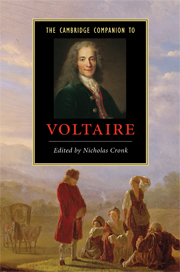Book contents
- Frontmatter
- Introduction
- 1 The making of a name: a life of Voltaire
- 2 Voltaire and authorship
- 3 Voltaire: philosopher or philosophe?
- 4 Voltaire and clandestine manuscripts
- 5 Voltaire and the myth of England
- 6 Voltaire’s masks: theatre and theatricality
- 7 Voltaire as story-teller
- 8 Candide
- 9 Voltaire and history
- 10 Voltaire’s correspondence
- 11 Voltaire: pamphlets and polemic
- 12 Voltaire and the politics of toleration
- 13 Voltaire and the Bible
- 14 The Voltaire effect
- Further reading
- Index
9 - Voltaire and history
Published online by Cambridge University Press: 28 May 2009
- Frontmatter
- Introduction
- 1 The making of a name: a life of Voltaire
- 2 Voltaire and authorship
- 3 Voltaire: philosopher or philosophe?
- 4 Voltaire and clandestine manuscripts
- 5 Voltaire and the myth of England
- 6 Voltaire’s masks: theatre and theatricality
- 7 Voltaire as story-teller
- 8 Candide
- 9 Voltaire and history
- 10 Voltaire’s correspondence
- 11 Voltaire: pamphlets and polemic
- 12 Voltaire and the politics of toleration
- 13 Voltaire and the Bible
- 14 The Voltaire effect
- Further reading
- Index
Summary
To think today of 'Voltaire historian' might seem odd, so far have his historical works fallen from critical fashion in the last fifty years. His Histoire de Charles XII, his Siècle de Louis XIV, his Essai sur les moeurs and his Histoire de l'empire de Russie sous Pierre le Grand are all little more than titles for most modern readers, who regard them as works that are at best old-fashioned, at worst obsolete. At most Voltaire might be credited with a talent for elegant popularisation, forced into playing into the hands of authority when he wrote the history of the 1741 war, becoming an 'official' historian, set on a path that was certainly prestigious (since, just as history painting was at the top of the hierarchy of the visual arts, so history and tragedy were the most elevated of the literary genres), but which at the same time caused him to turn his back on the fundamental issues at stake in a career dedicated to the most fervent form of philosophical militancy: the historian has to be impartial, but Voltaire cannot and even must not be. And so specialists of Voltaire or of Enlightenment thought, not finding them to their taste, seem destined to remain indifferent to Voltaire's historical writings. Everything seems to conspire to ensure that this part of his output, covering several thousand pages, should be confined to dusty libraries. Requiescant in pace?
However, it is clear that this sweeping conclusion - contradicted by the scholarly studies of J. H. Brumfitt, F. Diaz and J.-M. Moureaux, among others - takes no account of what his historical works meant for Voltaire himself and for his contemporaries. These are complex works in which he developed his essential ideas, and which in turn provided these ideas with an unrivalled vehicle for their diffusion. Without the influence of Voltaire, Gibbon would have conceived quite differently his Decline and Fall of the Roman Empire.
- Type
- Chapter
- Information
- The Cambridge Companion to Voltaire , pp. 139 - 152Publisher: Cambridge University PressPrint publication year: 2009
- 5
- Cited by

